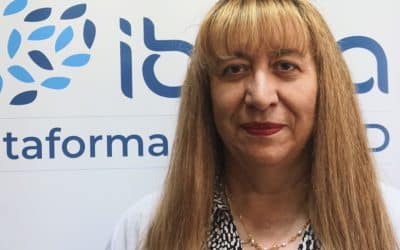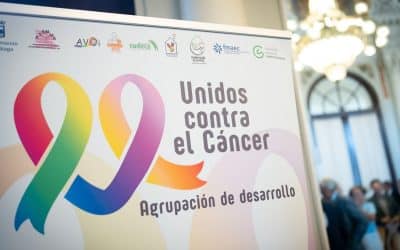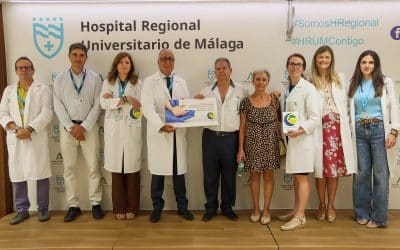The study, which has been applied in animal models, applies a stem cell-based therapy to regenerate a key tissue in the regulation of cerebrospinal fluid in the brain.
A team of researchers from the Biomedical Research Institute of Malaga and Nanomedicine Platform (IBIMA Plataforma BIONAND) and the University of Malaga (UMA), has led a study that advances the search for an effective therapy for ependymal repair in cases of post-hemorrhagic hydrocephalus associated with germinal matrix hemorrhage in neonates. This study, recently published in the journal Strokeexplores the potential of a stem cell-based therapy to regenerate ependymal tissue, key in the regulation of cerebrospinal fluid in the brain.
Posthemorrhagic hydrocephalus is a severe condition affecting premature neonates, characterized by the accumulation of fluid in the cerebral ventricles due to intraventricular hemorrhages. This accumulation can cause irreversible damage to the brain, so finding an effective treatment is of vital importance.
The study, led by the researcher of the group 'Degeneration and Regeneration of the Central Nervous System' and the Faculty of Sciences of UMA, Dr. Páez-González, uses an innovative combination of neural stem cells and ependymal progenitors, as well as mesenchymal stem cells, to restore damaged tissue in animal models. In this sense, Patricia Páez pointed out that the study “has shown that it is possible to regenerate ependymal cells using stem cells, which opens up a new avenue for treating post-hemorrhagic hydrocephalus in neonates”, although she recalled that these are “preliminary results that represent a further step towards the possibility of developing a therapy that could significantly improve the quality of life of patients affected by this condition”.
Experiments showed that stem cell treatment not only promotes the regeneration of ependymal tissue, but also reduces inflammation and cerebral edema, two of the main complications of post-hemorrhagic hydrocephalus. In this regard, Dr. Paez added that “the application of mesenchymal stem cells has been shown to improve the survival of ependymal progenitors and facilitate their differentiation into functional ependymal cells,” and again reminded that this study has only been carried out in animal models. This research group of the Institute is led by the Professor of Cell Biology, Genetics and Physiology of the Faculty of Sciences of the UMA, Antonio Jesús Jiménez.
In addition to professionals from the Faculty of Sciences, other researchers from other centers and departments of the UMA itself have participated in the study, such as the Department of Human Physiology, Human Histology, Pathological Anatomy and Physical and Sports Education and the Department of Radiology and Physical Medicine, Ophthalmology and Otorhinolaryngology of the Faculty of Medicine, as well as the Central Research Support Services (SCAI). At regional level, the Cell Production and Reprogramming Unit of the Andalusian Network for the Design and Translation of Advanced Therapies (RAdytTA), through the Progreso y Salud Foundation, as well as the national participation of the Biobazkai Health Research Institute of Barakaldo and the international participation of the University of Washington (USA).
Study reference:
Rodriguez-Perez LM, Ojeda-Pérez B, López-de-San-Sebastián J, García-Bonilla M, González-García M, Fernández-Muñoz B, Sánchez-Pernaute R, García-Martín ML, Domínguez-Pinos D, Cárdenas-García C, Jiménez AJ, Paez-Gonzalez P. Design of a Stem Cell-Based Therapy for Ependymal Repair in Hydrocephalus Associated With Germinal Matrix Hemorrhages. Stroke. 2024 Apr;55(4):1062-1074. doi: 10.1161/STROKEAHA.123.044677. Epub 2024 Mar 4. PMID: 38436063; PMCID: PMC10962438.
Raúl J. Andrade Bellido, es Investigador Responsable del grupo consolidado ‘Hepatogastroenterología, Farmacología y Terapéutica Clínica Traslacional’ de IBIMA Plataforma BIONAND, Catedrático y Director del Departamento de Medicina en la Facultad de Medicina de la Universidad de Málaga, Jefe de Servicio Aparato Digestivo del Hospital Universitario Virgen de la Victoria en Málaga. Además, es el Responsable del Grupo Español de Hepatopatias asociadas a medicamentos (Spanish DILI Registry), el Coordinador de la Red Ibero-Americana de Hepatopatías asociadas a medicamentos (SLATINDILI) y también del Registro europeo de Hepatopatías asociadas a Medicamentos (Pro-Euro DILI Registry). Chair de la COST Action CA17112 – Prospective European Drug-Induced Liver Injury Network (PRO-EURO DILI NET) y del EASL DHILI Consortium. Horizonte2020. Framework Programme (European Union).



